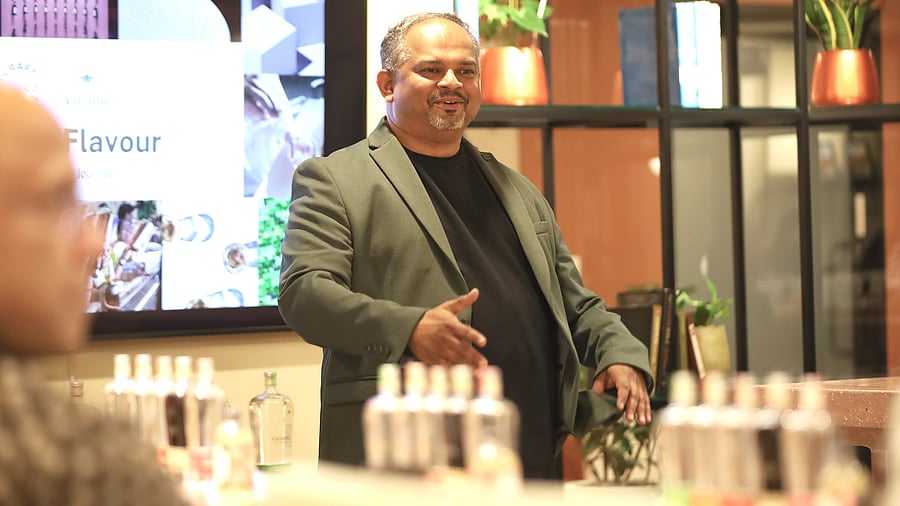
Cashew Feni Association secretary Hansel Vaz.
Cashew feni may make all the noise, but you aren’t always sipping it—sometimes it’s coconut feni in your glass, a less popular spirit with an even older history and story. Having suffered heavy blows for decades, the coconut feni is now carving a place in India’s premium bar culture.
As Hansel Vaz, secretary of the Cashew Feni Association, visited Bengaluru where he launched a ready-to-drink premium feni cocktail bottle and hosted a workshop at The Good Craft Co Flavour Lab, he spoke to DH.
Vaz revealed that a Coconut Feni Association will be launched soon, aiming to bring the recognition the Goan drink deserves. During the conversation, the feni expert reflected on the spirit’s revival, reinvention, and what lies ahead for it.
What makes you see Bengaluru as a test market for feni sales outside Goa?
Bengaluru is one of the most cosmopolitan cities in India today. Its newly settled audience is young, educated, well-traveled, and—most importantly—open to experimentation. It also happens to be the beating heart of India’s beverage ecosystem. Diageo has its India headquarters in the city, along with its The Good Craft Co Flavour Lab in Whitefield (TGCC).
If you were to imagine a ‘Bengaluru-style feni cocktail,’ what local ingredient or flavour would you pair it with?
I would think a South Indian-styled espresso martini. Drawing inspiration from Bangalore's rich coffee culture by using a robust, earthy base of Coorg Coffee Cold Brew, blended with the rustic, rich flavor of a cane jaggery syrup, dusted with a warm spice like Cinnamon and an orange peel for garnish.
What's the Indian market for feni like, is it growing and welcoming or a niche?
India is a vast and complex market when it comes to alcohol — layered with policies, red tape, and big players who dominate the shelves. Feni is an artisanal spirit that was never meant for the mass market, and it should stay that way. The drink has long been a victim of its own reputation, with its wonderful taste being overshadowed by a stigma it never deserved. The future lies in making feni approachable without losing its soul.
At present, Goa remains our largest market, with a couple of international markets on the horizon.
In which country is feni more popular?
Interestingly, the strongest interest has come from Japan, where feni is already being featured as a specialty spirit in high-end cocktails in a couple of top bars in Tokyo. The international bar community is beginning to recognise the remarkable card India holds with feni.
Is the feni market making monetary profit, or is the idea 'no price tag for heritage'?
Are we making money? Of course! Is it easy?...hell no! If it were, we would have seen many more people enter it.
Our feni tribe may grumble and mumble at times, but we carry with us the hope of a proverbial silver lining. Every spirit has had its day in the sun—whisky, vodka, gin, tequila. The question now is: who will be next? We are working, relentlessly, to make sure it is feni.
Is coconut feni gaining momentum or is cashew making all the noise?
Presently cashew feni is the more popular choice. Its less common cousin ‘coconut feni’ that has a far older cultural history was on the verge of obsolescence, despite it boasting sheer diversity and depth of flavor with nearly 20 different expressions.
Coconut feni predates cashew feni by centuries. Its history and culture are far deeper, ingrained into the very fabric of Goa. Sadly, post-liberation, coconut feni suffered heavy blows—both in quality and production—due to socio-economic shifts and prohibition in Mumbai. By then, many had already professed its last rites, and the industry seemed all but over.
But coconut feni is making a comeback, consumers are now beginning to rediscover the historic charms of this classic spirit.
How important is it to launch the Coconut feni association and when do you see it happening?
We have brought together distillers, toddy tappers, and bottlers under one banner: The Coconut Collective. Our singular vision is to secure GI recognition for coconut feni and to take this heritage spirit forward into a renewed future. The body will be set up within this year.
Cashew and coconut feni - what's your personal favorite?
When it comes to feni, my choice is driven by the season and my mood. A contemplative evening calls for a glass of duskhiri. For a relaxed afternoon, I would choose a coconut feni, and on a hot day, nothing beats a cashew feni cocktail.
While most know of the OG cashew and coconut feni, you have explored and experimented to produce a collection of feni flavours - what’s your top pick from them?
The true character of a feni can only be revealed when you realise it's far more than just the classic cashew feni. A spirit that captures a very rare and obscure flavour profile – Cazulo Premium Duskhiri Feni. The Konkani word is Dukshiri for what is called 'nannari' in Kannada. This unique expression of feni has subtle yet surprising notes of peanut butter, petrichor, salted caramel, and licorice. The result is a drink that feels both familiar and wonderfully unexpected.
Gin and whiskey are creating buzz for scented perfumes, any plans for you to make Feni-inspired fragrances?
Quite funnily, someone recently remarked that our Dukshiri, with its earthy, rain-kissed notes of petrichor, could almost work better as a perfume than a spirit. And honestly—we took it as a compliment. Because that’s exactly what Feni, and Dukshiri in particular, is all about: evoking memory, emotion, and a deep sense of place. It’s the scent of wet earth after the first rains, the feeling of Goan monsoons in a bottle, and the kind of sensory richness that lingers—not just on the palate, but in the imagination. When a spirit can blur the lines between flavour and fragrance, ritual and experience, you know you're working with something truly special.
In view of the sober curious moment, there are many 0.0% alcohol versions of spirits available in the market - should Feni make it there? Can you imagine a non-alcoholic feni?
While the urban elite may currently be leaning towards low-alcohol beverages—a trend that's gaining visibility—we're cautious not to misread a lifestyle shift as a mainstream market movement. It's important to observe these patterns, yes, but not be swayed prematurely by what could still be a fad.
Have you come across people saying ‘feni tastes like vodka’, what do you think is closely similar to feni?
Vodka would be a simplistic comparison. While feni is unique as it is double-distilled in a pot still, cashew feni bears closer resemblance to fruit spirits such and the coconut feni shares kinship with tequila or even the Japanese awamori in taste profiles.
With an Indian feni brand recently receiving the GI tag, what are your plans for Cazulo’s recognition?
When the GI was announced for Ozzo, both Cazcar and Cazulo were striving for the honour of being recognised as India’s first GI spirit—the first official spirit brand from the country.
Gurudatta Bhakta—much more senior, the president of the Cashew Feni Distillers and Bottlers Association, was also in the running for the recognition of GI tag. It was important that a person of authority and a man who has worked longer and harder than I have for the cashew feni GI received the recognition first and set the benchmark for the industry.
Cazulo is close behind, and we expect to launch a GI-recognized feni by next year under a new Cazulo portfolio.
Is Cazulo just meant for a sip for it has a collection value too that people can flaunt on their bar shelves?
Cazulo Premium Feni was always designed to be more than just a spirit—it’s something to savour, to collect, to pass down.
Even today, we’re still crafting Batch 1 expressions of our newer variants, and that alone carries immense value. In fact, the first 32,400 bottles of Cazulo were hand-stamped by me, personally. Every single one. What started as bad label printing turned into something bigger—it was commitment, care, a mark of pride. But if you’re looking for true collector’s value, the real gems are the first 120 bottles—handwritten, unique, and irreplaceable.
One of my closest friends who I went to school with, managed to buy a few and has treasured them ever since. He promised to give them back when we reach 70.
Once we get the GI tag, these bottles will be a testament to the land, the craft, and the people behind it.
Feni is widely seen as a white spirit, but the Cafe Conserva has surprised and delighted me. Can you tell us more about this "Goan spit coffee"?
Feni is not just a drink—it is one of the world’s most ancient distilled spirits, crafted in Goa for over 500 years. With no television, internet, or even telephones, our ancestral distillers were guided only by imagination. They experimented boldly, exploring the possibilities of flavors and botanicals in ways that remain unmatched even today. Among these expressions, Cafe Conserva or coffee feni liqueur speaks of a now extinct coffee culture in Goa.
While coffee traditions persisted in Portugal and flourished spectacularly in Brazil, Goa gradually turned to tea—acknowledging that Brazil produced a superior bean. Yet, in feudal Goa, many elites maintained coffee bushes on their estates. Children were allowed to eat the ripe berries, on the condition that they spat the seeds into a tin. Over the season, these seeds would naturally ferment, later to be roasted and served as an offering of homegrown coffee to esteemed guests.
I found this story deeply compelling and it led me to create Cafe Conserva, our coffee feni expression. For me, it wasn’t just about flavor—it was about reviving a forgotten piece of Goa’s cultural memory.
